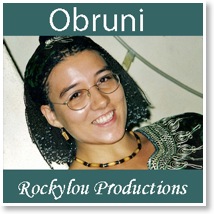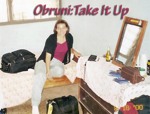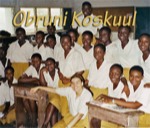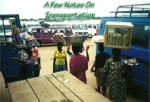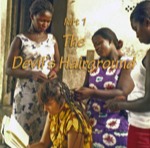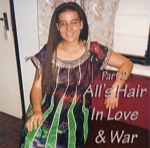Obruni
by Amber Lockridge
This collection of audio podcasts, entitled "Obruni", documents Amber Lockridge's time as an AFS exchange student in Takoradi, Ghana, Africa from August 2000 thru June 2001. The podcasts were created from stories and letters written during and following her stay.
We invite you to listen and enjoy the first five of twelve planned episodes by clicking on a photo below or opening an episode "twistie" to see photos & download podcast scripts.
by Amber Lockridge
This collection of audio podcasts, entitled "Obruni", documents Amber Lockridge's time as an AFS exchange student in Takoradi, Ghana, Africa from August 2000 thru June 2001. The podcasts were created from stories and letters written during and following her stay.
We invite you to listen and enjoy the first five of twelve planned episodes by clicking on a photo below or opening an episode "twistie" to see photos & download podcast scripts.
Click Image to Listen
Open Episode "Twistie" for Podcast Scripts & Photos
Episode 1: Obruni:Take It Up (12:09)
Episode 1: Amber arrives in Ghana in “Take it up”. The new "Obruni", or white person, both delights and scares the young children of Takoradi. In this, our first episode, explore the contrast between preconception and reality and discover the ways music can transcend cultural divides. {LISTEN} [SCRIPT]
Published: 10/18/10
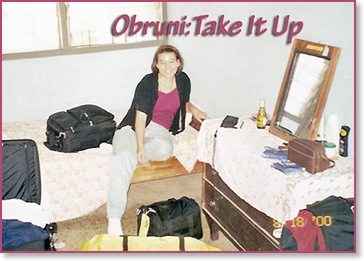
Amber arrives in Ghana
"Did I have any idea what I was in for when I registered to spend a year in Ghana as an exchange student? I thought so then, now I am far less sure."
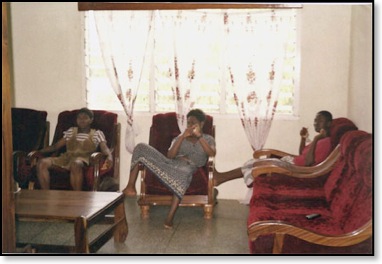
Three new sisters (L to R): Boatema, Maameaba and Emi sitting in the living room.
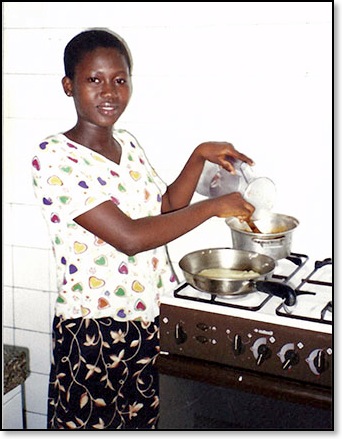
Emisaba (Emi) showing her cooking skills
"I live in the upper level of a modestly sized, if poor, concrete house. There is a gas stove and a refrigerator…"
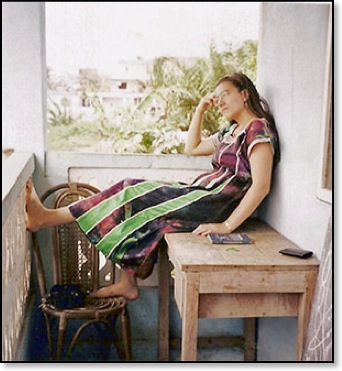
"…even a veranda where I often sit to look out over the city."
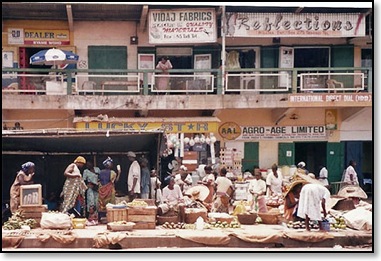
"I am, perhaps, the only white girl moving purposefully through a dense crowd of West Africans milling about Market Circle."
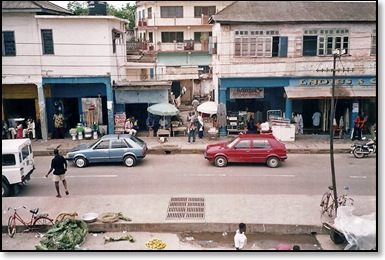
"They move haltingly through the streets, serving to avoid pedestrians and honking incessantly. The air is heavy with the smell of food, sweat, and sewage, which runs openly through concrete gutters along the sides of the street."
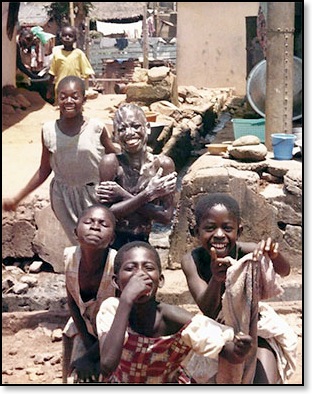
“Bruni, Bruni” they yell, waving their hands enthusiastically. I smile and wave back. The two boys are ecstatic to have successfully attracted my attention. They jump up and down, pumping their arms back and forth in glee before sprinting out of view. A few minutes later they are back, dragging with them four or five others."
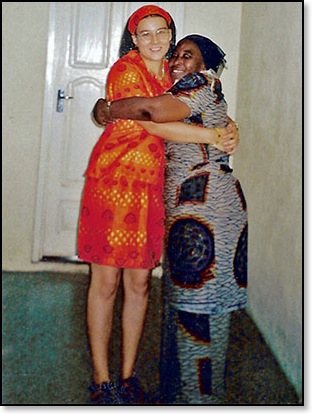
"Though my skin has tanned significantly from the near translucent-white I was sporting upon arrival, I am surprised at how pale they are compared to the local scenery. My host mother tells me “Kuukua, you’re an African now.”
{LISTEN} [SCRIPT]
Published: 10/18/10

Amber arrives in Ghana
"Did I have any idea what I was in for when I registered to spend a year in Ghana as an exchange student? I thought so then, now I am far less sure."

Three new sisters (L to R): Boatema, Maameaba and Emi sitting in the living room.

Emisaba (Emi) showing her cooking skills
"I live in the upper level of a modestly sized, if poor, concrete house. There is a gas stove and a refrigerator…"

"…even a veranda where I often sit to look out over the city."

"I am, perhaps, the only white girl moving purposefully through a dense crowd of West Africans milling about Market Circle."

"They move haltingly through the streets, serving to avoid pedestrians and honking incessantly. The air is heavy with the smell of food, sweat, and sewage, which runs openly through concrete gutters along the sides of the street."

“Bruni, Bruni” they yell, waving their hands enthusiastically. I smile and wave back. The two boys are ecstatic to have successfully attracted my attention. They jump up and down, pumping their arms back and forth in glee before sprinting out of view. A few minutes later they are back, dragging with them four or five others."

"Though my skin has tanned significantly from the near translucent-white I was sporting upon arrival, I am surprised at how pale they are compared to the local scenery. My host mother tells me “Kuukua, you’re an African now.”
{LISTEN} [SCRIPT]
“Take It Up”, discovers the way music can transcend cultural divides.
Comments
Episode 2: Obruni Ko Skuul (16:11)
Episode 2: “Obruni Ko Skuul”, follows a typical day in the life including routines that offer a sense of pride and comfort as well as those that raise questions about personal morality in the face of cultural expectations, with an inside look at the experience of attending school. {LISTEN} [SCRIPT]
Published: 12/31/10
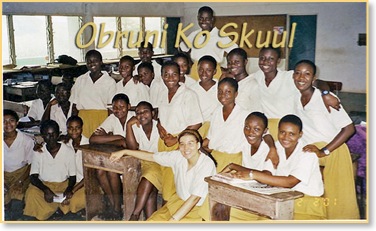
"There are twenty-six girls in my class, all black with hair cut within half an inch of their heads. Though it's been two months, I'm still their Barbie doll… We are the Form 2 Visual Arts girls, with a notorious reputation for garrulousness."
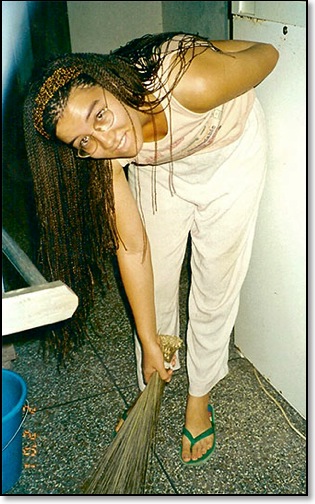
"Stumbling first into my house sandals and then into the kitchen, I retrieve the straw hand-held broom and head for the living room. Then, like every morning, I bend over and sweep the floors in all the rooms of the house and the outside steps."
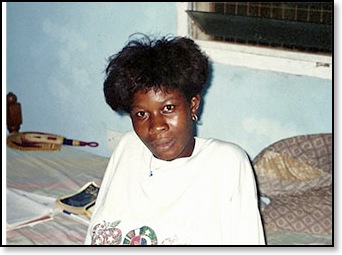
"The eldest sister, Ama, is a seamstress with wild crazy hair that stands straight up from her head in the mornings."
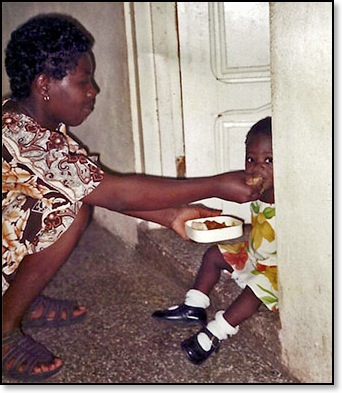
"My youngest sister, Abena, is a vivacious two years and is generally walking around screaming for my nineteen-year old sister, Maameaba, to come and bathe her."
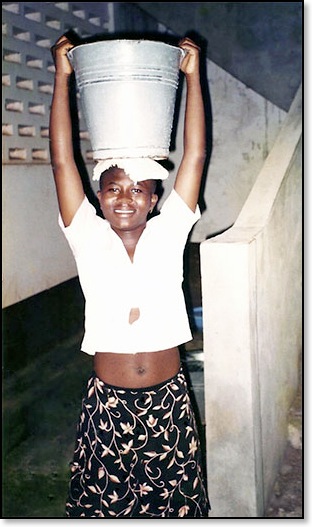
"My younger sister, Boatema, has left boiled oats on the stove and is probably out buying a loaf of fresh bread…. My mother seems to spend most of the morning yelling at Boatema to hurry up."
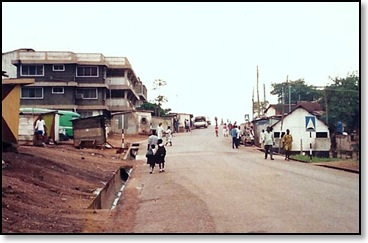
"At a quarter to 7:00 I walk down the road to meet my friend Anita and we head off for school. We walk a good 10 minutes to the nearest junction… Children are playing in the street and a long parade of men has lined up outside of the public toilets."
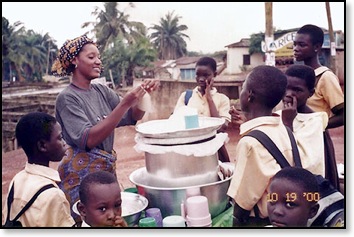
"People are everywhere. Women are selling cocoo, ballfruit, and fried plantain."
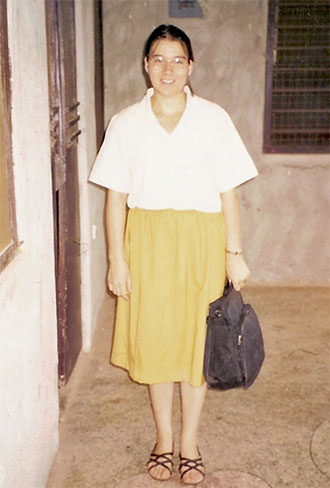
"We must look like stalks of corn in neat even rows with our golden colored skirts and cream cotton blouses. "
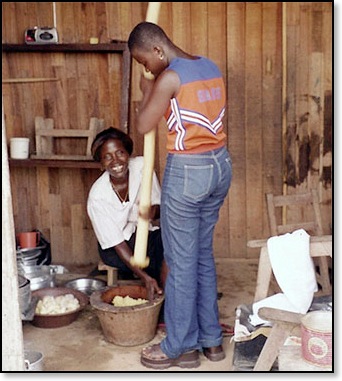
"The fufuu is made by boiling cassava root and plantain. These are laboriously pounded with a large stick and mortar until they form a dough-like substance."
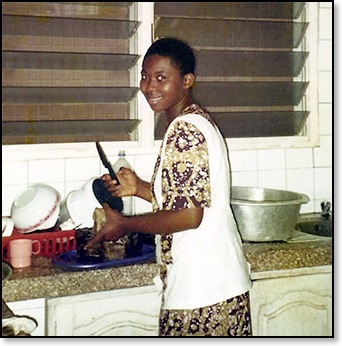
Maameaba (my new sister) in the kitchen
"I prefer kinke, a sharp tasting paste-like ball wrapped in banana leaves. Ghanaians tend to alternate between a few main dishes. Most of these consist of a carbohydrate, such as cassava or yam, eaten with a variety of tomato-based stews."
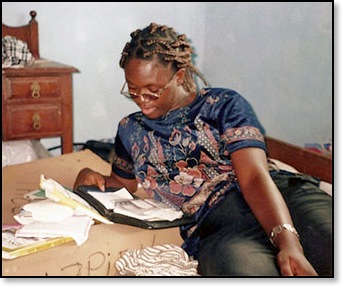
"Anita and I gossip about the day or often discuss politics."
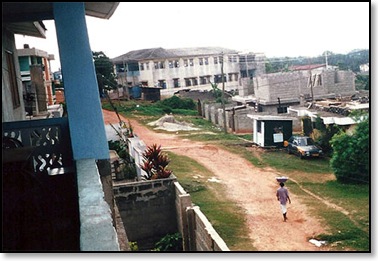
"If there are dishes in the kitchen, I wash them before settling on the verandah for a quiet moment to watch the sellers pass by with buckets balanced on their heads."
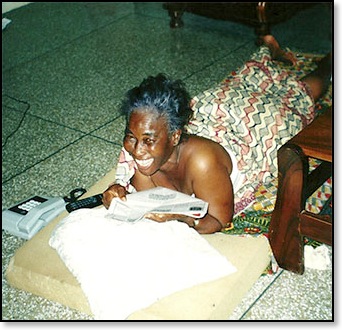
"My mother and I share a special tradition of watching the news at 7:00. We're the only family members that never miss a night. My mother likes to talk at the TV and the laughter is continuous."
{LISTEN} [SCRIPT]
Published: 12/31/10

"There are twenty-six girls in my class, all black with hair cut within half an inch of their heads. Though it's been two months, I'm still their Barbie doll… We are the Form 2 Visual Arts girls, with a notorious reputation for garrulousness."

"Stumbling first into my house sandals and then into the kitchen, I retrieve the straw hand-held broom and head for the living room. Then, like every morning, I bend over and sweep the floors in all the rooms of the house and the outside steps."

"The eldest sister, Ama, is a seamstress with wild crazy hair that stands straight up from her head in the mornings."

"My youngest sister, Abena, is a vivacious two years and is generally walking around screaming for my nineteen-year old sister, Maameaba, to come and bathe her."

"My younger sister, Boatema, has left boiled oats on the stove and is probably out buying a loaf of fresh bread…. My mother seems to spend most of the morning yelling at Boatema to hurry up."

"At a quarter to 7:00 I walk down the road to meet my friend Anita and we head off for school. We walk a good 10 minutes to the nearest junction… Children are playing in the street and a long parade of men has lined up outside of the public toilets."

"People are everywhere. Women are selling cocoo, ballfruit, and fried plantain."

"We must look like stalks of corn in neat even rows with our golden colored skirts and cream cotton blouses. "

"The fufuu is made by boiling cassava root and plantain. These are laboriously pounded with a large stick and mortar until they form a dough-like substance."

Maameaba (my new sister) in the kitchen
"I prefer kinke, a sharp tasting paste-like ball wrapped in banana leaves. Ghanaians tend to alternate between a few main dishes. Most of these consist of a carbohydrate, such as cassava or yam, eaten with a variety of tomato-based stews."

"Anita and I gossip about the day or often discuss politics."

"If there are dishes in the kitchen, I wash them before settling on the verandah for a quiet moment to watch the sellers pass by with buckets balanced on their heads."

"My mother and I share a special tradition of watching the news at 7:00. We're the only family members that never miss a night. My mother likes to talk at the TV and the laughter is continuous."
{LISTEN} [SCRIPT]
"Obruni Ko Skuul", follows a typical day in the life with an inside look at the experience of attending school.
Comments
Episode 3: A Few Notes On Transportation (8:04)
Episode 3: “A Few Notes on Transportation” is a short collection of humorous observations, from a foreigner learning to navigate local transport methods and police enforcement. {LISTEN} [SCRIPT]
Published: 6/15/11
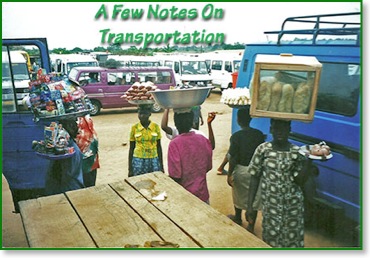
"A fellow passenger was once kind enough to explain to me that most tro-tros started life as small Nigerian cargo holders, minivans designed to seat two or three people per row."
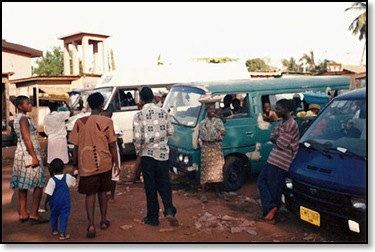
"With this in mind, consider the following standard procedures for Ghanaian tro-tro seating. A tro-tro is never considered full until each row is occupied by, at minimum, four-paying passengers."
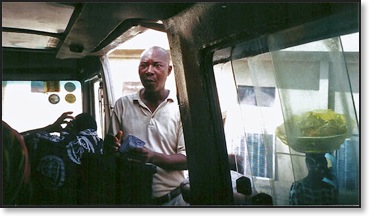
"Monetary value is assigned only to the occupation of a seat itself. Cost efficiency, therefore, may require you to squeeze as many as 3 or 4 other people’s small children between your legs."
{LISTEN} [SCRIPT]
Published: 6/15/11

"A fellow passenger was once kind enough to explain to me that most tro-tros started life as small Nigerian cargo holders, minivans designed to seat two or three people per row."

"With this in mind, consider the following standard procedures for Ghanaian tro-tro seating. A tro-tro is never considered full until each row is occupied by, at minimum, four-paying passengers."

"Monetary value is assigned only to the occupation of a seat itself. Cost efficiency, therefore, may require you to squeeze as many as 3 or 4 other people’s small children between your legs."
{LISTEN} [SCRIPT]
"A Few Notes On Transportation" from a foreigner learning to navigate local transport and police.
Comments
Episode 4: Part 1: The Devil's Hairground (13:06)
Episode 4: “Part 1: The Devil's Hairground” is the first of a two part series reliving an arduous and humorous experience of Amber's Obruni adventure to the beauty salon that no one will forget. {LISTEN} [SCRIPT]
Published: 7/6/12
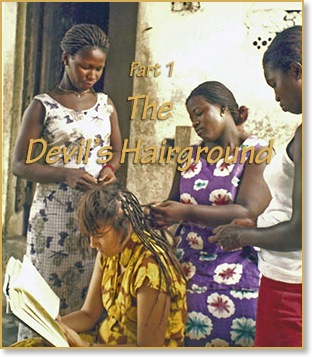
Published: 7/6/12

"The Devil's Hairground" - Part 1 of a trip to the hair salon no one will ever forget.
Comments
Episode 5: Part 2: All's Hair In Love And War (14:17)
Episode 5: "Part 2: All's Hair In Love And War" continues Amber's epic but light hearted journey of initiation from a head of wispy Caucasian optimism to tightly braided African pride as a hopeful suitor enters the shop… {LISTEN} [SCRIPT]
Published: 11/3/12
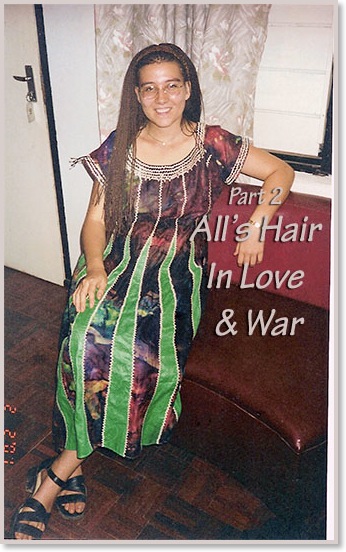
Published: 11/3/12

"All's Hair in Love and War" - Part 2 of an epic journey of initiation at the hair salon- enter a hopeful suitor.
Comments
These podcasts are recorded and lovingly cultivated by Rockylou Productions. The background music, “Apatampa” from “Ghana: Rhythms of the People CD” is being used with permission from Multicultural Media (www.multiculturalmedia.com or www.worldmusicstore.com)
If you are unable to get the imbedded player to work correctly, right click on the files below and save to your computer. The files are relatively large (~15Mb) and download time will vary greatly depending on your connection speed. Be patient while they download.
Take It Up Podcast | Ko Skuul Podcast | Transportation Podcast | Devil's Hairground Podcast | All's Hair Podcast |
